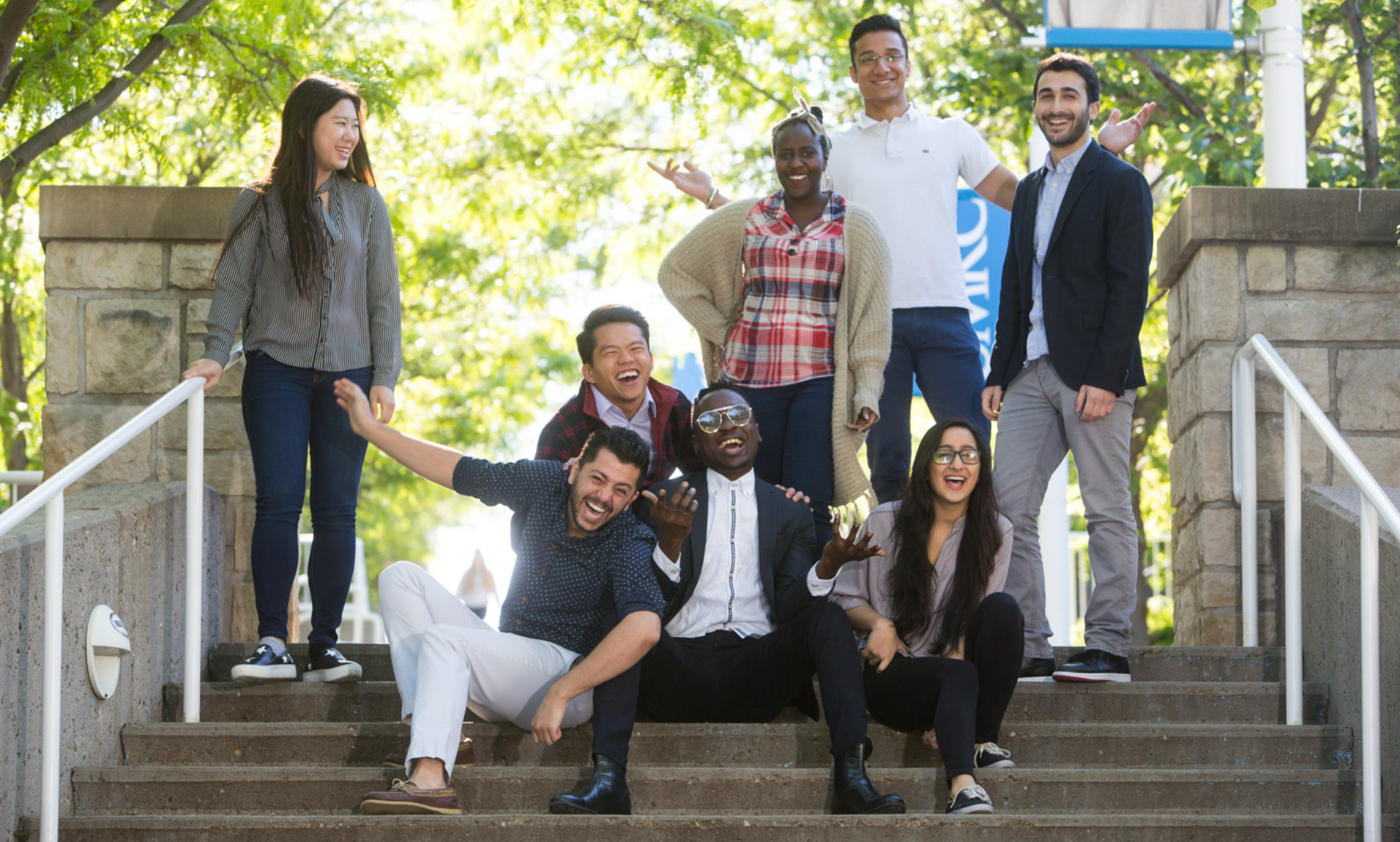
Tips from an international student graduating from UMKC
Culture shock can be hard. It’s okay! I have been through it too, and you will survive.
Personally, the best thing for me has been to keep an open mind and enjoy every part of the ride. Here are three additional tips that helped me transition to life in the U.S. and Kansas City.
1. Get to know your sports.
Most Americans are sports fans. Don’t be surprised to see your peers walking around in their jerseys and having deep conversations when it's football, soccer or baseball season. Kansas City has world-class teams, so join in and have some fun!
I enjoy Kansas City Royals baseball games a lot. They play at Kauffman Stadium, which is a must see, and the games are exceptional; not to mention they won the 2015 World Series and got the city going crazy. The baseball season begins late March and goes until October.
Sporting Kansas City is the major-league soccer team. Their fans go crazy during the games, which creates a really exciting atmosphere. If you have time, you can spend the afternoon at The Legends outlets and then cross the street for the game. Soccer season goes from March until December.
Did you know Kansas City has the loudest stadium crowd in the world? Arrowhead Stadium, the home of the Kansas City Chiefs (American football) has claimed those bragging rights. You seriously can’t miss this—gear up and get ready to make some noise! Football season begins in September and playoffs go until February. In the 2018 season, the Chiefs were really close to making it to the Super Bowl, so you your fellow fans are very excited!
2. Diversity is everywhere.
If you are concerned about being the only “different” one, and if you are thinking you won’t fit in, believe me, it most likely will not happen. The U.S. has people from a variety of backgrounds, which leads to different beliefs, attitudes, customs and traditions. In my time here, I have met people from all over the world, and that has probably been the most amazing part of my time here in the U.S. I have truly appreciated spending time with people who have taught me new customs, traditions and even a new language. Have an open mind all the time!
3. Make your solo debut.
Being self-sufficient is highly valued in the U.S. It is very common that people leave their homes and become independent after they turn 18 years old. A lot of students you will meet will have internships during their studies. Take advantage of the opportunities, because — let me tell you — there are a lot! I have had two internships that have been truly exceptional and allowed me to put into practice skills learned in the classroom. I highly encourage you to consider these opportunities!
This is another great approach to the American culture: learn a bit more than simply life as a student. I learned the hard way to do laundry, clean, cook and even put air in my tires. It is a learning process, so when you make a mistake, get a good laugh and learn from it. And, hey, don’t worry too much. These days we have the ease of Google and YouTube tutorials for just about everything—so learning can’t be THAT bad … right?
Jun 06, 2019
KCTV 5 News
JEFFERSON CITY, MO (KCTV) -- Hundreds of workers and volunteers are helping out in Jefferson City, clearing paths through the debris to get to homes and businesses.Among them is a group from UMKC, because there's an academic interest in this tornado, too. Read more…
May 31, 2019
Startland News
As the number of teams left standing in the Enactus U.S. nationals started to dwindle, members of the competitive entrepreneurial development program’s team at the University of Missouri-Kansas City rode a pulsating wave of excitement and emotion, recalled Ali Brandolino. Read more…
May 31, 2019
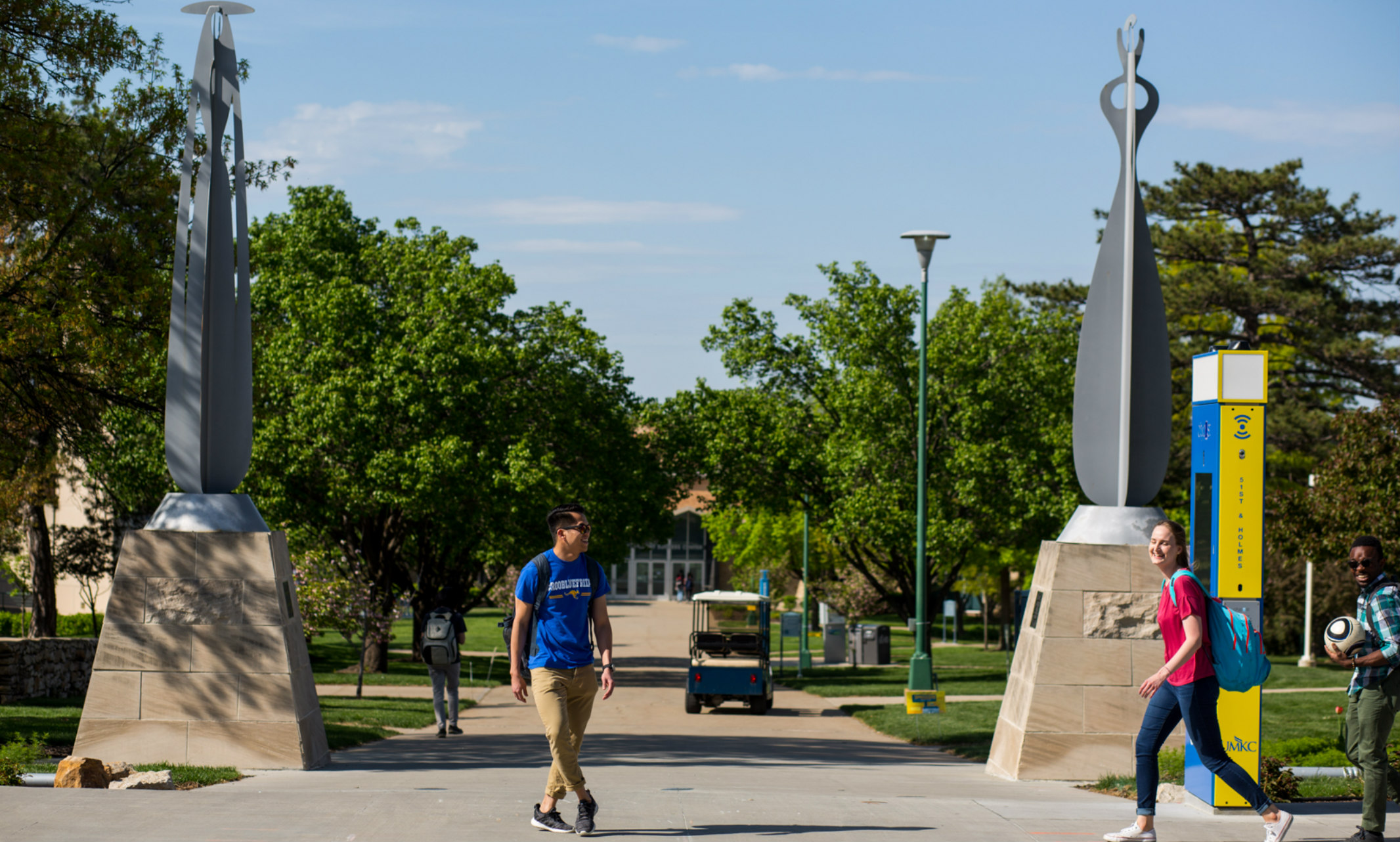
Resources for your protection
Enjoy everything our dynamic urban environment at UMKC has to offer and rest assured your safety is our top priority.
Campus Housing
All campus housing facilities maintain the highest level of security for students, such as UMKC ID card-swipe access into the buildings and a 24-hour front desk. UMKC also has its own police force, comprised of 30 state-certified officers, that covers both the Volker Campus and Health Sciences Campus at Hospital Hill.
Campus Police
If you feel unsafe on campus at any time, call UMKC Police directly at 816-235-1515 or pick up one of the blue emergency phones on campus and you’ll be connected directly to campus police.
Having car trouble? UMKC Police can assist with jumpstarts for dead batteries and can help if you locked your keys in your car.
Services provided by UMKC Police:
Personal safety escort (on campus only)
Motorist assistance (jumpstarts and unlocks only)
Property registration (electronics, bicycles and instruments)
Hostile intruder training
Safety presentations: alcohol, drugs, theft prevention, personal safety
Women’s self defense, hosted by the Kansas City Police Department (free)
Registration: 816-413-3500, 6835 N.E. Pleasant Valley Road
Fingerprinting: $15 per card
UMKC is a very low-crime campus. Theft is the most frequent offense, so here are some helpful tips from UMKC Police:
Keep your residence and vehicles secured at all times
Never leave your valuables unattended
Criminals love social media: watch what you post on social media; don’t mention when you’re going out of town
Campus Alerts
In addition to having a dedicated police force, UMKC also has its own campus-wide alert system. You may have automatically signed up for the UMKC Alert System (text, email, phone) when you submitted your personal information upon enrollment. If not, you can sign up for the alert system online.
UMKC also uses the free Rave Guardian app (available on Android and Apple app stores) which can transform your cell phone into a personal safety device. With this free app, you can create a virtual safety network, immediately connect with campus police and let others know you are safe.
Features allow you to:
Receive campus-wide safety notices
Communicate with your friends, family and coworkers
Set a safety timer–notify people you trust to check in on you if you are walking alone or in an unfamiliar place
Send a tip/message to police
Send pictures to police
Guardian can also provide police with GPS coordinates from your phone (if available), which can decrease response time and allow first responders to locate you should you not be able to give them your location
Download Rave Guardian App
May 31, 2019
Startland News
Gharib Gharibi is driven to succeed by a desire to pay it forward, he said, riding a high from his startup’s first-place, $20,000 win at UMKC’s Regnier Institute Venture Creation Challenge. Read more…
May 31, 2019
Fox 4 KC featured UMKC golfer and cancer survivor Sam Humphreys in a story highlighting his return to the golf course
KANSAS CITY, Mo. -- Overcoming the elements and the golf course Sunday was certainly a challenge for the Web.com players. But how about overcoming cancer?
UMKC golfer Sam Humphreys can laugh now, but last summer was no laughing matter. Read more…
May 31, 2019
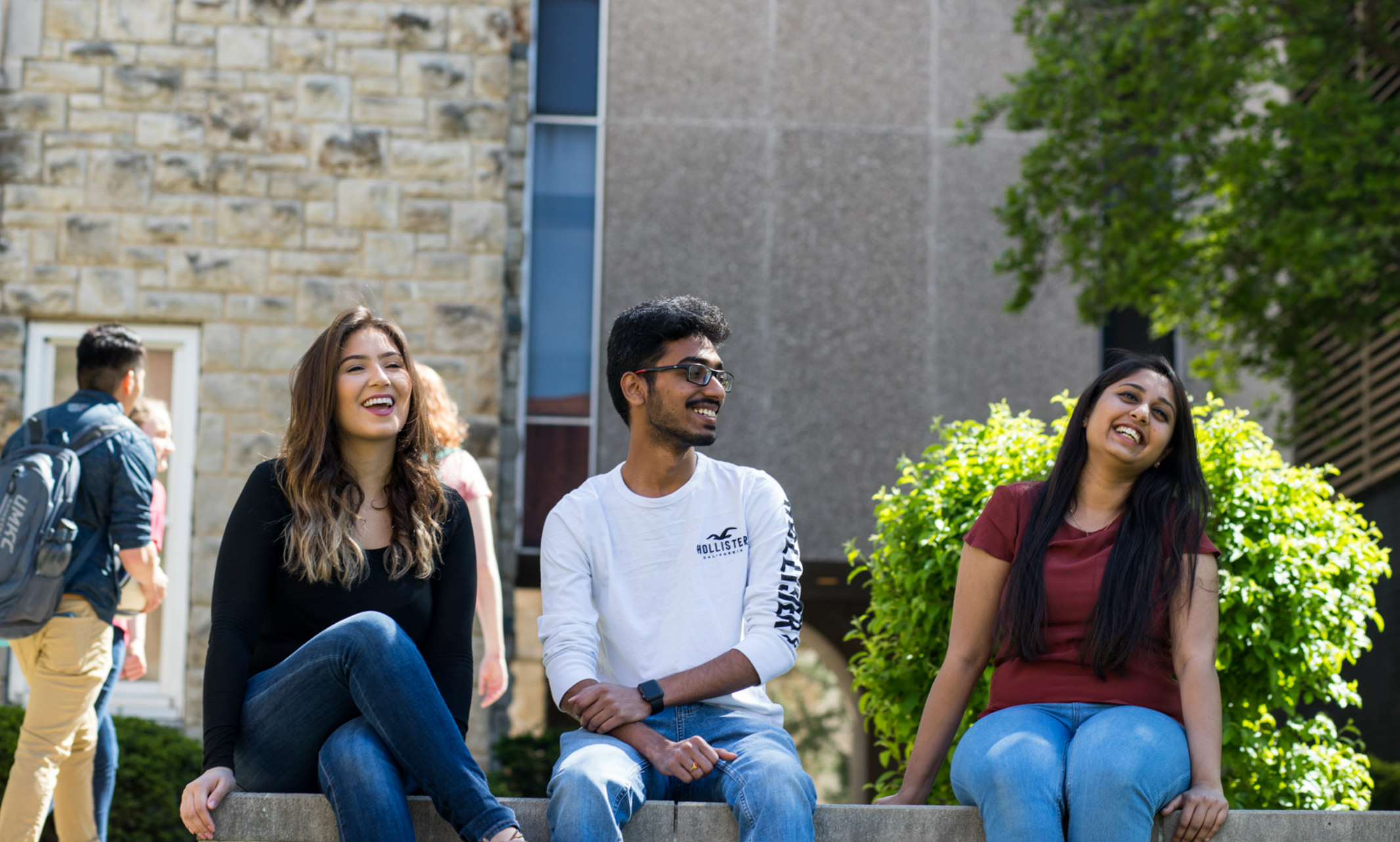
How I found my people at UMKC
Moving away from home and making new friends can be really intimidating. But forming new friendships is a critical part of college. And you don’t have to be really outgoing to have a social life. In my experience, these are some of the best ways to make and meet new friends on campus.
1. Get yourself out there by getting involved.
With more than 300 student organizations at UMKC, there are lots of ways to get involved on campus. Join different clubs, sororities/fraternities, sports teams or religious organizations that seem interesting to you. These settings are usually where students find a network of friends to be around.
To see the list of student organizations, explore our Roogroups page. You can also visit the Office of Student Involvement for more information on how to get involved.
2. Hang out on campus regularly.
Rushing to your car after class is probably not the best way to get to know others on campus. Go grab coffee at Jazzman’s in the Student Union or lunch at Einstein Bros. in Royall Hall. This is where most of the socializing happens, and it’s a great way to find opportunities to make new friends.
3. Attend as many school-related events as you can.
There is always plenty to do at UMKC. Look for flyers of on-campus events that interest you and go! Attending something you love with others creates a special bond and an easy way to start a conversation. I attended a lot of events on campus—even before I was officially a student here at UMKC—and that’s where I met most of my current friends.
4. Find an on-campus job.
Finding an on-campus job is a great way to get to know others. It gives you the opportunity to see familiar faces and finally get the chance to get to know them 1-on-1. Your coworkers can also be a great help to you in the future, whether you need a great reference for a job or help with school work.
5. Strike up a conversation any chance you get.
Whether it’s on the elevator or sitting and waiting for class to start, take the opportunity to talk to others around you. For example, we had to break into groups in my class and I did not know anyone in that class. I asked the student next to me if she would like to be my partner and now she and I are really good friends. If I never asked her to be my partner, our friendship probably wouldn’t exist right now.
Not everyone has the courage to speak to someone first. If that’s the case for you, then try using small tactics like smiling first to see if the person is approachable. The worst that can happen is not getting a smile back. Whatever is it is, it’s important not to get discouraged. With enough patience and confidence you can make friends anywhere and everywhere!
Visit UMKC
May 30, 2019
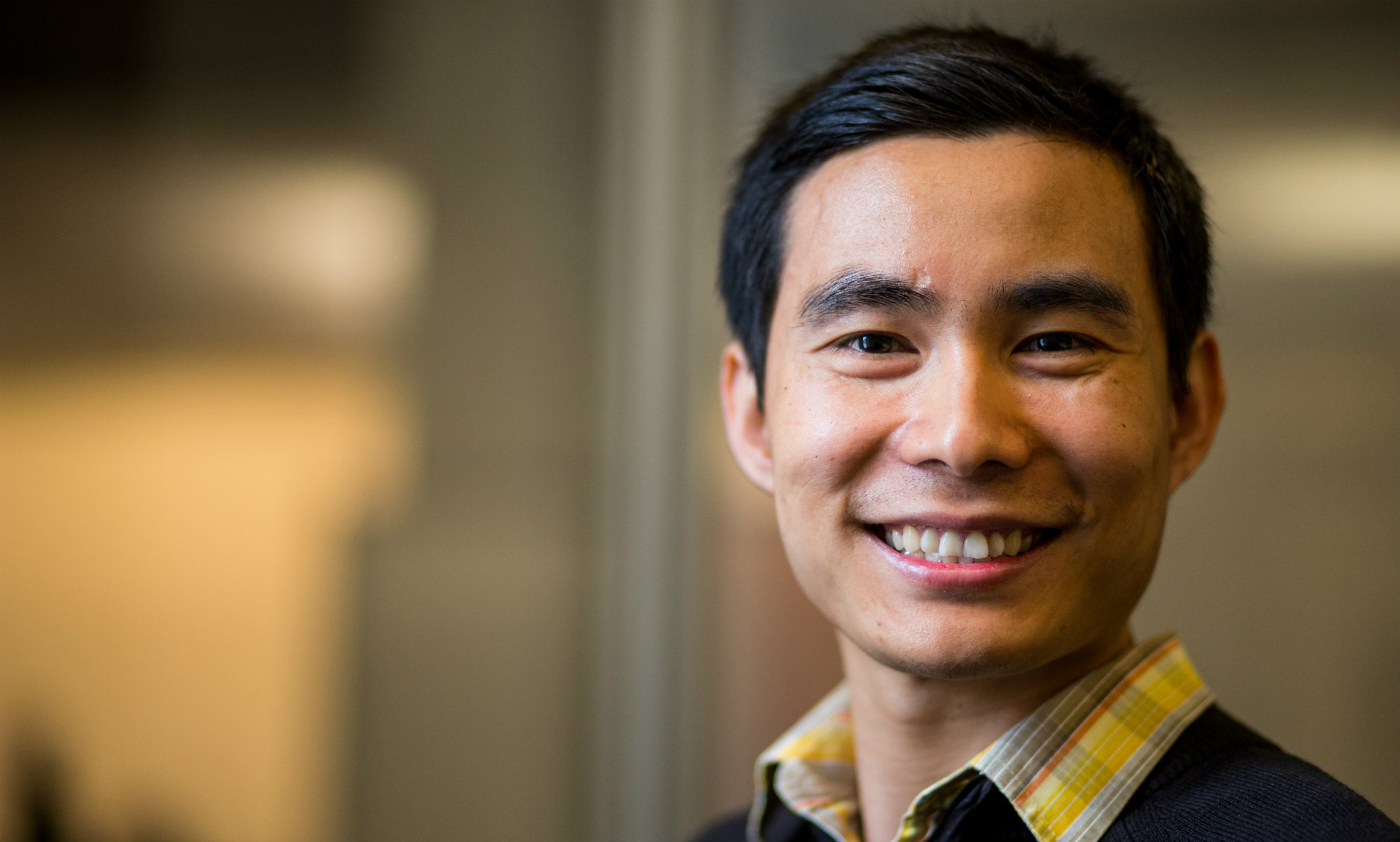
Ka Baw Say teaches us there is more to college - and life - than work and books
Ka Baw Say '22UMKC degree program: EducationHometown: Pa Loe village in Myanmar (Burma)High school: Number 3 High School in Karen refugee camp in Thailand
Get to know our people and you'll know what UMKC is all about.
Ka Baw Say immigrated to the United States when he was 19 years old with his older brother and sister. He was driven to improve his life and his education, but one of his greatest lessons has been making time to make friends and have fun.
"We wanted a good future,” says Say of him and his siblings. “Our parents did not come with us. They were worried, but they didn’t want to stop us. They wanted us to have a good life.”
Say is a member of the Karen immigrant community. Because of political unrest and civil war in his home country of Myanmar (Burma), he and his family were constantly moving. Say entered a Karen refugee camp in Thailand when he was seven years old. The following 10 years were a struggle.
“Living in the refugee camp was like animals living in their stables,” he says. “We did not have an identity. Lives do not really mean anything there.”
Say spent his first three years in Kansas City getting oriented, working and teaching himself English. He did not go to classes or use a tutor, but instead relied the internet. He learned very quickly.
“I love the language,” he said. “It’s so beautiful. It is like listening to the birds singing.”
Say worked, attended Metropolitan Community College and earned his high school equivalency certificate. When he felt he was ready he began to look for the best fit for college. He chose UMKC.
“UMKC is a place of diversity. I’m not afraid to express myself here. I needed to be in a place where I could be what I want to be.”
Say has been very involved with his niece and nephew. This led him to follow in his parents’ footsteps – who were teachers - to pursue a degree in education.
A student in the School of Education, he has secured teaching certificates in five subject areas and discovered a lot about his strengths and weaknesses during his student teaching. He feels that experience will help him do a good job.
Say is warm and often smiling. His eyes are bright and curious. While his story seems one of continued success, he says he struggled with making friends.
“I came from a place of one culture, one language, one color,” he says. “My country is not developed. People don’t travel in the same way. They all have the same perspective.”
He felt different when he came to the United States.
“In this country people seem so confident in who they are,” he says.
Say spent most of his time working and studying. The opportunity to initiate and develop friendships seemed inaccessible. But one day he stopped in the cafeteria and two students sitting a table asked him if he wanted some information on Phi Gamma Delta, a fraternity on campus.
“It changed everything,” Say says.
Joining the fraternity provided social connection; soon he began to develop friendships. Say realize that he needed more than school.
“I had been working so hard, that I had forgotten there were other things,” he says. “Then I realized these experiences were necessary for me to further my success. All the motivation and strength came from these connections. Everything seemed to move faster.”
Say will take his Missouri Education General Education Associate test in May. This will qualify him to teach in Missouri schools when he graduates. While he is still humble about his accomplishments, he recognized that he has learned so much on his journey.
“Be determined,” he advises. “Life is not simple and easy. Put yourself out there, challenge yourself and get to know your environment.”
But beyond the work, he has gained insight into what will drive his life’s success and he would like to share his story – perhaps by writing a book - so other people know that they can accomplish the same things.
“When you can be who you are, that’s when you’re perfect. Be a simple human. Simple, but perfect.”
May 24, 2019
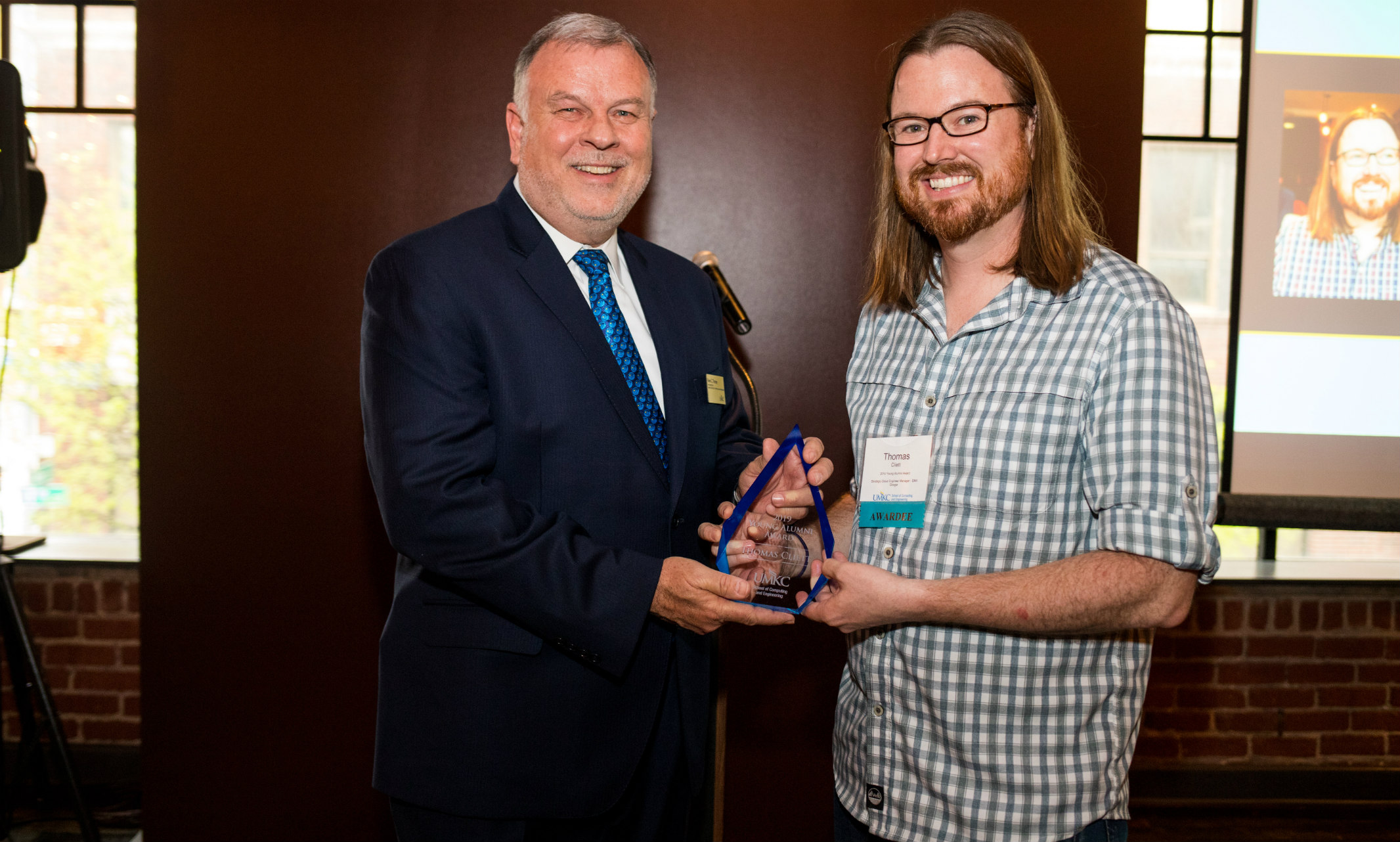
10 questions with Thomas Cliett (B.S.E.C.E. ’10)
School of Computing and Engineering Young Alumni Award recipient Thomas Cliett (B.S.E.C.E. ’10) credits his experience at UMKC as his initial motivation to advocate for diversity and inclusion in STEM.
Growing up in Beavercreek, Ohio, Cliett said he walked around blissfully unaware of how different his world was compared to that of his friends and fellow students, a mix of women and people of color. As a strategic cloud engineer at the Google France office in Paris, Cliett continues to volunteer and make conscious hiring decisions to help close racial and gender gaps in STEM.
Learn more about his journey from his hometown in Ohio to Paris, France. Roos are everywhere and Cliett sat down to share how he got there.
Why did you choose to attend UMKC?
I was working for Sprint at the time, and UMKC was the first school I visited. I was so impressed by the amount of time the school took to talk to me and help me decide on a degree that I stopped looking right there. Sprint paid for most of my school.
How did your relationships with faculty influence your success as a student?
The faculty at UMKC were amazing. I’ve attended three universities and the level of availability of UMKC faculty and their willingness to help students find interesting ways to engage is similar to what I expect from an excellent manager in my career.
The encouragement I received from Rhiannon Dickerson to participate in speech contests and develop my public speaking skills has been extremely valuable for when I’m giving C-level presentations and for being an effective technical speaker at conferences. Also, the work in neural networks that was encouraged and facilitated by Dr. Reza Derakhshani continues to influence my career decisions and my technical passions. I am currently building a smart-home control platform that uses tensor flow lite models to make decisions on controlling lights and heating in my house.
Finally, Dr. Cory Beard taught me a lesson about customer management that I come back to constantly in my career. He says at the start of each quarter that we pay the tuition so he works for us, and therefore he should do whatever it takes to make sure we get a good education in the area he is teaching. A variation of this phrase still shapes the way I think when working with both internal and external customers.
“Still today, I first ask myself ‘why are we proposing this approach?’ and if the answer is unsatisfying,‘is there a better approach?’ I thank Dr. Derakhshani for a lot of this acquired muscle in critical thinking.”
Who was your favorite professor and what did they teach you?
There’s a saying that goes “when you have a hammer, everything looks like a nail,” and working with Dr. Derakhshani really drove this point home. While the information I acquired in his class around machine learning and neural networks helped me to understand how many Google tools work fundamentally, the real lesson was to look for the right tool for the problem. In class and in the lab, Dr. D would consistently drive home the point with data and examples that we needed to suit our approach to the problem instead of the other way around. This simple lesson has made me a vastly superior engineer to the one I would be without it. Still today, I first ask myself “why are we proposing this approach?” and if the answer is unsatisfying, “is there a better approach?” I thank Dr. D for a lot of this acquired muscle in critical thinking.
What is your role at Google and what does it entail?
I manage an engineering organization. My engineers support all customer cloud deployments valued at $1 million a year or greater in Europe, the Middle East and Africa. My — fairly enviable — role is to hire the smartest people in the world and get the heck out of their way. Secondary to that, I set strategy regionally and globally. I find problems that need high-level engagement to solve and I solve them. I provide coaching to my engineering managers so they can build the strongest teams possible and I try to stay relevant as an engineer.
What is the biggest lesson you’ve learned so far in your career?
The most valuable thing I’ve learned is that everyone has a list of problems, the most valuable engineers are those who can bring and execute on solutions. This was true when I was an engineer individual contributor and it is true now that I manage an organization. In fact, I keep a list on Google Drive called “cool things we should do” where I add every problem I come up against that does not have a solution today. I share this list with my entire organization because I am definitely not smart enough to know all the answers. When I do know how to solve the problem, I take it off the list and own it from launch to landing. My team does the same. The net effect is our engineering team has a reputation for execution excellence and that makes me feel proud of them.
Briefly outline your career path and how it led to Paris.
I dropped out of my first university to join a couple of startups back to back. After a while, I got burned out and took a less stressful job managing phone technicians at Sprint stores and depots in Nebraska and Iowa, and then in Missouri and Kansas. That’s when I started attending UMKC.
2009 happened, and I was laid off like everyone else but decided to finish my degree at UMKC. After completing my education, the economy was still terrible so I decided to take another year off to travel around the world, and spend time with friends and loved ones.
Upon returning to the workforce I spent a brief time in design, verification and validation testing for a water treatment plant on a copper mine in the upper peninsula of Michigan. Shortly after, I moved to Dallas to be a sales and integration engineer for Operating Theaters with Stryker, Inc. The amazing part about this job is that I got to observe surgical flows during live surgeries, then design operating rooms around the way top-tier surgical teams work and finally see the results of my improvements to their physical space. It was a very rewarding role.
I moved to San Francisco to take a job with Google in 2013 supporting the largest websites that use Google Ads products. In 2014, that role took me to Washington, D.C. After doing that for two years, I wanted a new challenge so I interviewed to be a cloud engineer in London. Due to customer demand and my meager French skills I was offered a role in Paris instead, which I happily accepted. Since then I have grown from the manager of an engineering team to my current role as the head of an engineering organization.
“If you propose something contentious and you look around the room to see a lot of nodding heads, you probably don’t have enough diversity of thought in the room.”
You give back to the SCE often, especially in support of underrepresented groups. Can you detail more of your philanthropic activity?
The most tangible thing I do is contribute to the Doris Markham Swinney Endowed Scholarship, which provides scholarship support to women engineers. I also do some work to support historically excluded groups in and out of work:
Technovation mentor. Technovation offers girls around the world the opportunity to learn the skills they need to emerge as tech entrepreneurs and leaders. Each year they invite girls to identify a problem in their community, and then challenge them to solve it. In 2017, the team I mentored was a semifinalist in the Europe competition. I also mentored five teams in 2018.
Help the Women @ Leadership group design and implement programs meant to empower women in Google France and in France (non-Google)
Global Diversity lead for the cloud engineering organization
CareerGuru at Google
What inspires you to give back?
I have a dual motivation for giving back. As a white male from the Midwest in engineering, I spent most of my life blissfully unaware that there was actually a disparity between what the world looked like for me and what it looks like for others. Coming to UMKC and being in a classroom setting, and subsequently forming friendships with both black and female students really opened my eyes to my ignorance, and I have not been able to close them since. It offends my sense of fair play to have groups of people excluded not only by the biases of today but also because of the weight of historical bias.
My second motivation is because I want to live in a better world, faster. By almost any metric, teams with diverse opinions outperform teams without. Whether it is my engineering team at Google or a team working on the battery technology of tomorrow or an orchestra performing, I want every team to outperform. The first step in doing that is just having the voices of historically excluded groups added, and that starts with education.
“Be curious, learn more about the things you are curious about, and never think that your tech skills today will carry you all the way to retirement.”
What’s next in your career?
Retire? I just started my own business in France but I don’t intend for it to be more than a side gig, hopefully. I am pretty happy helping to drive change in the cloud organization in Google. If this ever becomes a more settled business like Google Ads, I will probably be looking for the next messy challenge where I can keep learning, failing and growing.
What advice would you give students looking to start a career in tech?
Luck is important but so is hard work. I have been handed a lot of great opportunities in my life that I squandered because I didn’t understand that.
If you propose something contentious and you look around the room to see a lot of nodding heads, you probably don’t have enough diversity of thought in the room. The day I go to a leadership meeting and we don’t fight about everything is the day I will go and hire someone with a fresh perspective.
Always keep growing. I have been lucky that I have never had the same job twice so I have been forced to acquire new skills regularly. Things I learned at my first two jobs still help to influence decisions I make today, but those tech skills are no longer valuable. Be curious, learn more about the things you are curious about, and never think that your tech skills today will carry you all the way to retirement.
May 24, 2019
KCultivator Q&A with Chad Feather who ventured to China and back, stayed for KC kindness, community
On May 24, Startland News featured Chad Feather in KCultivators, a lighthearted profile series to highlight people who are meaningfully enriching Kansas City’s entrepreneurial ecosystem. Read more.
May 24, 2019
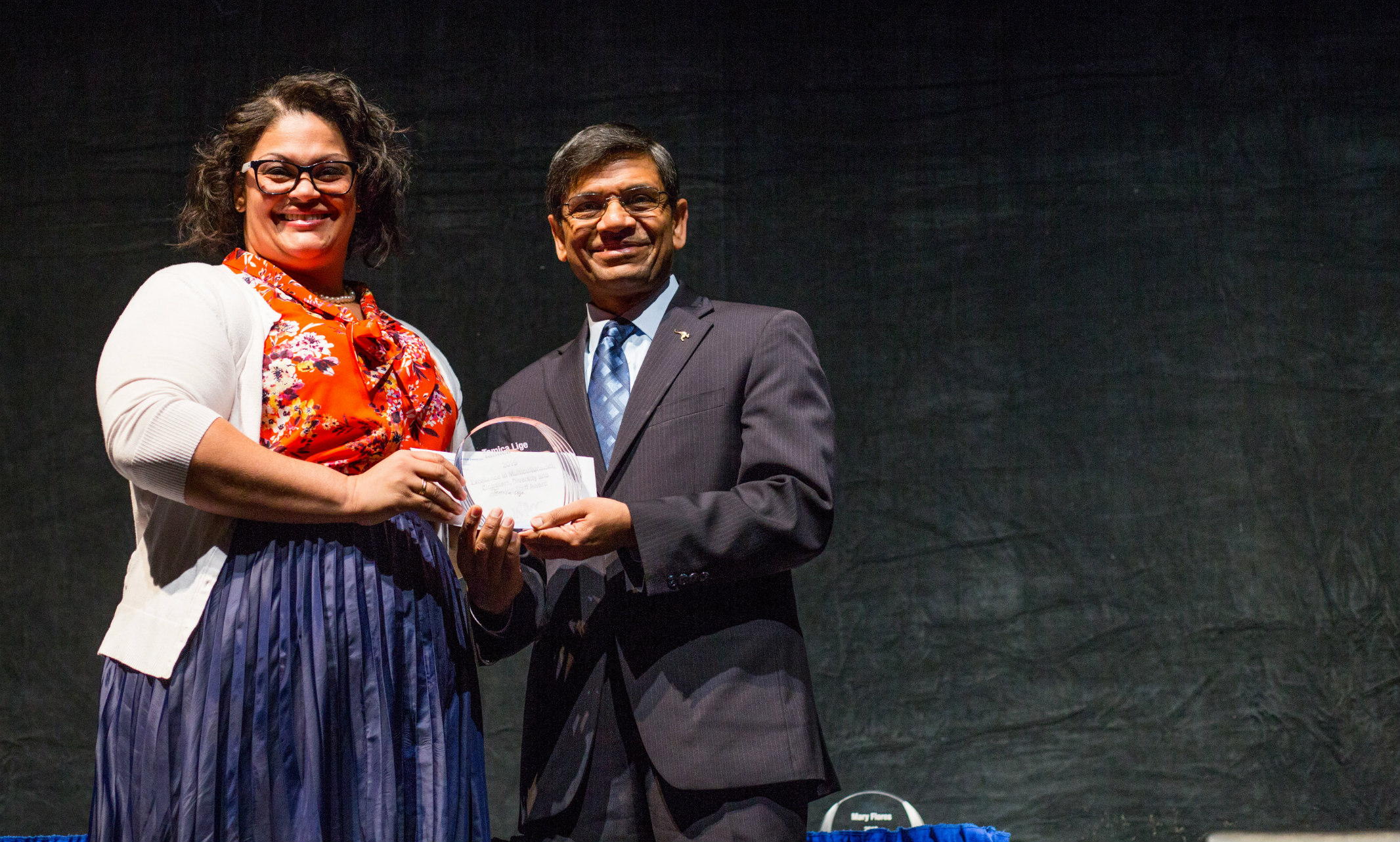
Staff Award recipient in multiculturalism encourages others to be uncomfortable in order to be able to grow.
The staff of the School of Pharmacy initiated Tamica Lige’s nomination for the Excellence in Multiculturalism, Globalism, Diversity and Inclusion Staff Award, but her support and influence across the UMKC campuses are broad.
“I am passionate about diversity and inclusion because I am passionate about people,” Lige says. “It might sounds cliché, but to me life is about the relationships and the connections we form with others. Diversity lends richness to our lived experience and helps us see the world through varied perspectives.”
Lige, who is the site coordinator in the School of Pharmacy, is an advocate for building relationships through collaboration and partnership across disciplines and organizations to develop stronger networks for underrepresented minority students and foster student success.
One supporter mentioned Lige’s ability to lead by example.
“She has a way with people that allows her to turn ‘ouch’ moments into teaching moments.”
Lige says she sees the value in an awkward encounter.
“We all have to get used to being uncomfortable and know that we will be better for it,” she says. “When we allow ourselves to be vulnerable, we give ourselves the opportunity to grow and learn. Diversity training is not the end all be all for change, but it is a good place to start. It positions people with the knowledge and tools to meaningfully and productively engage in difficult conversations, and liberates mindsets.”
“We each have to hold ourselves accountable for change.” – Tamica Lige
Lige believes that as an institution of higher education, UMKC has a responsibility to prepare students to exist in, navigate through and contribute to a diverse world.
“In order to affect attitudes and behavioral change, we must lead with empathy and create a space where everyone can be authentically themselves,” she says.
Lige was overwhelmed when she discovered her co-workers had nominated her for the staff award.
“When I found out that I had been nominated and selected, I actually cried,” Lige says. “Social justice work, while difficult at times, satisfies my soul.”
Lige hopes that her work will continue to foster broader understanding. While she notices that there is a core group of committed people focused on diversity, equality and inclusion at the university, she hopes their influence will spread.
“I would challenge students, faculty, staff and administrators to use the buddy system and bring at least one friend with you when you attend a diversity training or event on campus,” she says. “We each have to hold ourselves accountable for change.”
In addition, she encourages members of the community to step outside of their usual routines and interactions and get to know people who are different from them.
“Break out of your comfort zone and move through your environment in a way you never have before,” Lige says. “When people feel valued, respected, included and able to be their true selves, morale goes up, productivity increases and creativity soars. Diversity is everything.”
Lige knows that changes don’t just happen, but are the result of working with purpose.
“When you have genuine interactions with people different than you, amazing things start to happen.”
“Someone recently told me, ‘Your greatness does not come from what you have, but instead from what you give.’ I hope that what I give makes a difference. I am only a small pebble but even the smallest pebbles make ripples in the water.”
May 22, 2019
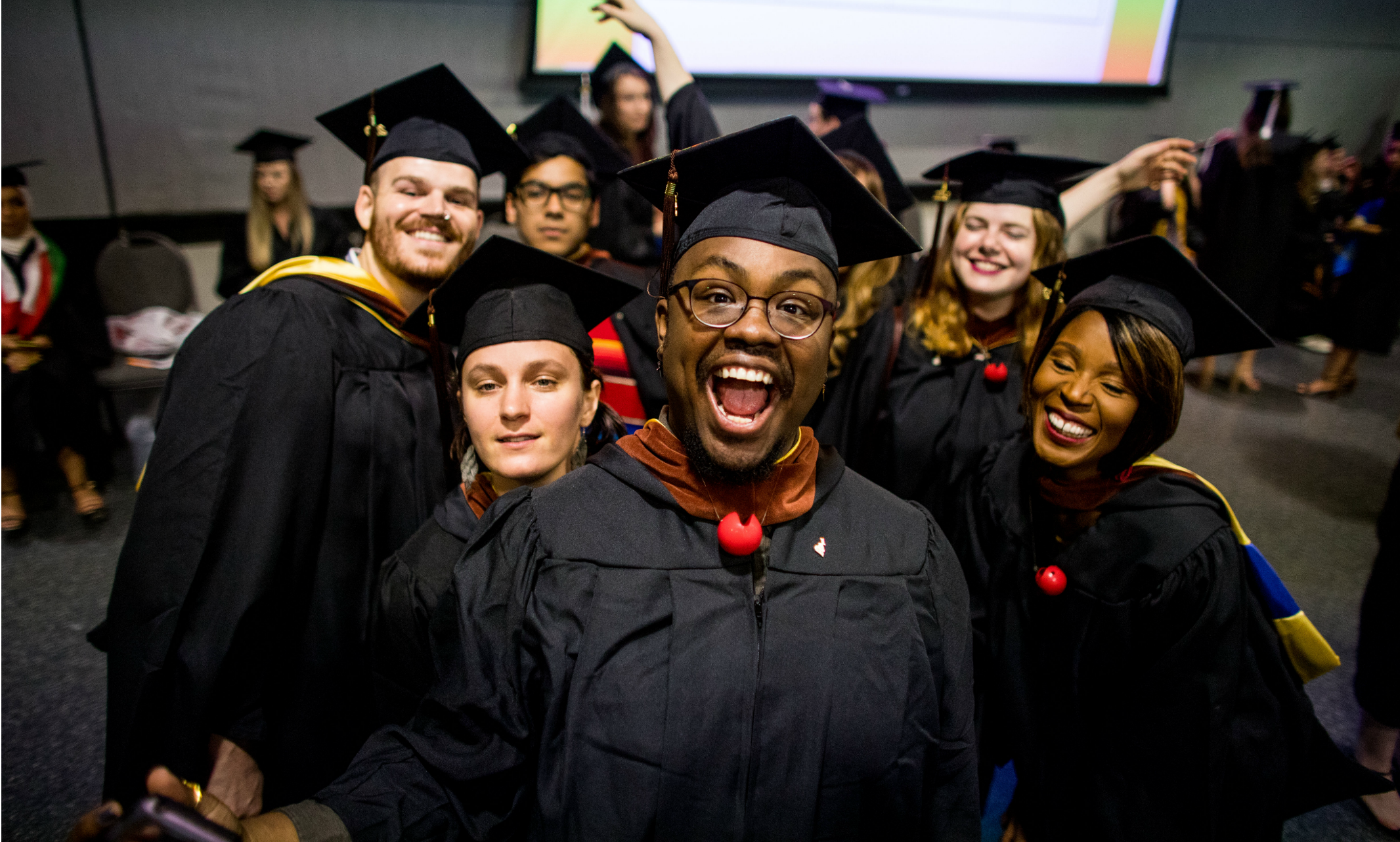
Class of 2019 graduates and KC native Calvin Trillin honored
More than 2,000 students received their UMKC degrees during end-of-year commencement exercises this weekend.
Over the course of 12 different ceremonies and a number of graduation events, we celebrated the class of 2019 and all their accomplishments. Here’s a look back at the month’s festivities.
Avanzando Year-End Celebration
Avanzando is a partnership between the Hispanic Development Fund (HDF) and the UMKC Division of Diversity and Inclusion that supports HDF Scholarship and Agapito Mendoza Scholarship recipients.
Students celebrate the end of the year at the Avanzando celebration. Photo by Brandon Parigo.
Multicultural Graduate Reception
Forty-four graduates were recognized by family, friends, mentors, faculty and staff on May 2. All graduates received a multicultural stole and first-generation college grads receive a "1st Gen ROO" lapel pin. The reception was sponsored by the Office of Multicultural Student Affairs, the UMKC Multicultural Student Organization Council, UMKC Student Affairs and UMKC Alumni Multicultural and Community Affairs Committee.
Students recognized during the 2019 UMKC Multicultural Graduate Reception.
Lavender Graduation and Pride Awards
Ninety people gathered to honor the achievements of 10 LGBTQIA+ students during Lavender Graduation on May 8. The event included a presentation of the Pride Awards, which recognized individuals who have contributed to the betterment of our LGBTQIA+ community at UMKC.
Congratulations to the following 2019 Pride Award recipients:
Outstanding Faculty/Staff Award: Sadie DeSantis
Jim Wanser Award: Todd Wells
Outstanding Alum Award: Samuel Lim
Collaborative Excellence Award: Multicultural Student Affairs
LGBTQIA+ Student of the Year: Trae Tucker
“Be of service to others. Try to understand what others are feeling. And connect to others all that you can. And you will most certainly have very good luck.” — Jim Lammers
College of Arts and Sciences Graduation with Distinction Luncheon
Butch Rigby, Arts and Sciences and Law alumnus, spoke at the luncheon recognizing students who earned Magna Cum Laude and Summa Cum Laude distinction. Rigby encouraged students to use their 20s to try new things, have adventures and find what they excel at, and then be responsible in your 30s.
Attendees at the Conservatory of Music and Dance commencement ceremony at Kauffman Center for the Performing Arts. Photo by Brandon Parigo.
Vice Chancellor for Student Affairs Honor Recipients
This program recognizes the exceptional students who maintain high scholastic performance while actively participating in university and community leadership and service activities outside of the classroom.
Anne Case-Halferty
Hanna Fiedler
Paige Husa
Elisabeth Laundy
Rania Mahrous
Cara Nordengren
Sierra Richard
Sarah Shin
Brandon Woods
Taylor Carter
Frances Grimstad
Jewel Janke
Annie Liljegren
Imran Mizamuddin
Brandon Ortega
Nikki Sherwood
Allison Spunaugle
“I was told by a high school counselor college wasn't for me. But here I am, a college graduate giving a commencement speech. Celebrate tonight. Wake up tomorrow and go change the world.” — Steven St. John
Commencement Speakers and Honorees
Spotted on Instagram, new grad Ravali Reddy, "Is it just me or is it one degree hotter in here?"
Speakers during the ceremonies included:
Diane Beatty, School of Biological Sciences alumna and vice president of regulatory and clinical affairs, Immunophotonics
Ingrid Burnett, Conservatory alumna and Missouri State Representative
Arif Kamal, School of Medicine alumnus and associate professor, Duke University
Jim Lammers, Computing and Engineering alumnus and president of Trinity Animations
Paula Peterson, Bloch alumna and vice president and director of strategy, finance and marketing, Commerce Bancshares, Inc.
Eric Schmitt, Missouri Attorney General
Steven St. John, College of Arts and Sciences alumnus and host of the popular morning show “Border Patrol,” 810 WHB
Jayson Strickland, School of Education alumnus and incoming superintendent, Hogan Preparatory Academy
Deborah Trautman, president and chief executive officer, American Association of Colleges of Nursing
"Be of service to others. Try to understand what others are feeling. And connect to others all that you can. And you will most certainly have very good luck," said Jim Lammers.
"I was told by a high school counselor college wasn't for me. But here I am, a college graduate giving a commencement speech. Celebrate tonight. Wake up tomorrow and go change the world," Steven St. John urged graduates.
UMKC also awarded an honorary doctorate to Kansas City native and New Yorker contributor, Calvin Trillin, an American journalist, humorist, food writer, poet, memoirist and novelist.
Longtime contributor for the New Yorker Calvin Trillin was presented with an honorary doctorate. Photo by Brandon Parigo.
May 20, 2019
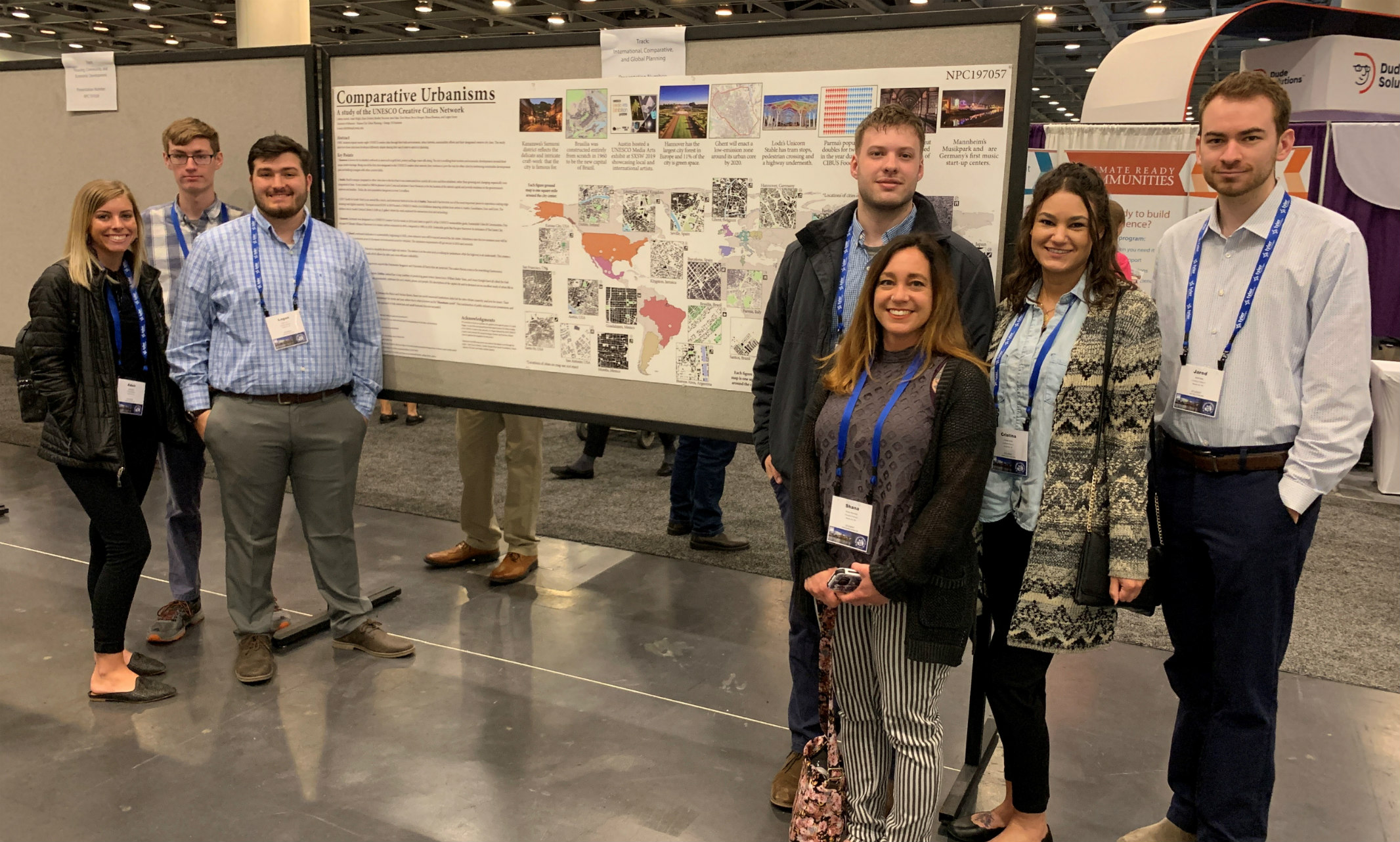
Project focused on international, comparative and global planning issues
A team of undergraduate students in Architecture, Urban Planning and Design at the University of Missouri-Kansas City took top honors for a research poster presented at the National Conference of the American Planning Association Conference in San Francisco, California.
The poster entitled “Comparative Urbanisms” was submitted and presented as part of the APA National Conference April 13-16. The research focused on international, comparative and global planning issues. The UMKC student research team included Jared Islas, Adair Bright, Logan Sours, Brad Hocevar, Bryce Morgan, Cristina Aurich, Thomas Meyer, Shana Shanteau and Ryan Deeken.
The UMKC students developed the poster from research completed in the fall semester of 2018 under Associate Professor Jacob A. Wagner, AICP. The assignment tasked students with a comparative analysis of three creative cities from the UNESCO Creative Cities Network.
The students compared the different elements of urbanism, creativity and sustainable development. Twenty-seven UNESCO Network cities were studied including Kansas City and each student reviewed sustainability policies and plans from the respective cities. Students learned about the 17 Sustainable Development Goals of UNESCO and how each city is working to implement these goals.
The mission of the UNESCO Creative City Network is to promote sustainable development through creativity. The seven areas of creativity recognized by UNESCO include crafts and folk arts, design, film, gastronomy, literature, media arts and music.
Kansas City joined the UNESCO Creative Cities Network in 2017 as the first City of Music in the United States. UMKC’s Urban Planning and Design program contributed to the development of the research that led to Kansas City’s membership in the network.
The student research was reviewed by several local professionals active in cultural planning and the arts, including Anita Dixon, cultural advocate and UNESCO Creative City coordinator; Anna Marie Tutera, executive director of the Kansas City Museum; and Sonié Joi Thompson-Ruffin, fabric artist and co-founder of the African American Artists Collective.
UMKC’s Urban Planning and Design Program prepares students for careers in urban planning and sustainable development through a rigorous curriculum accredited by the Planning Accreditation Board.
May 17, 2019
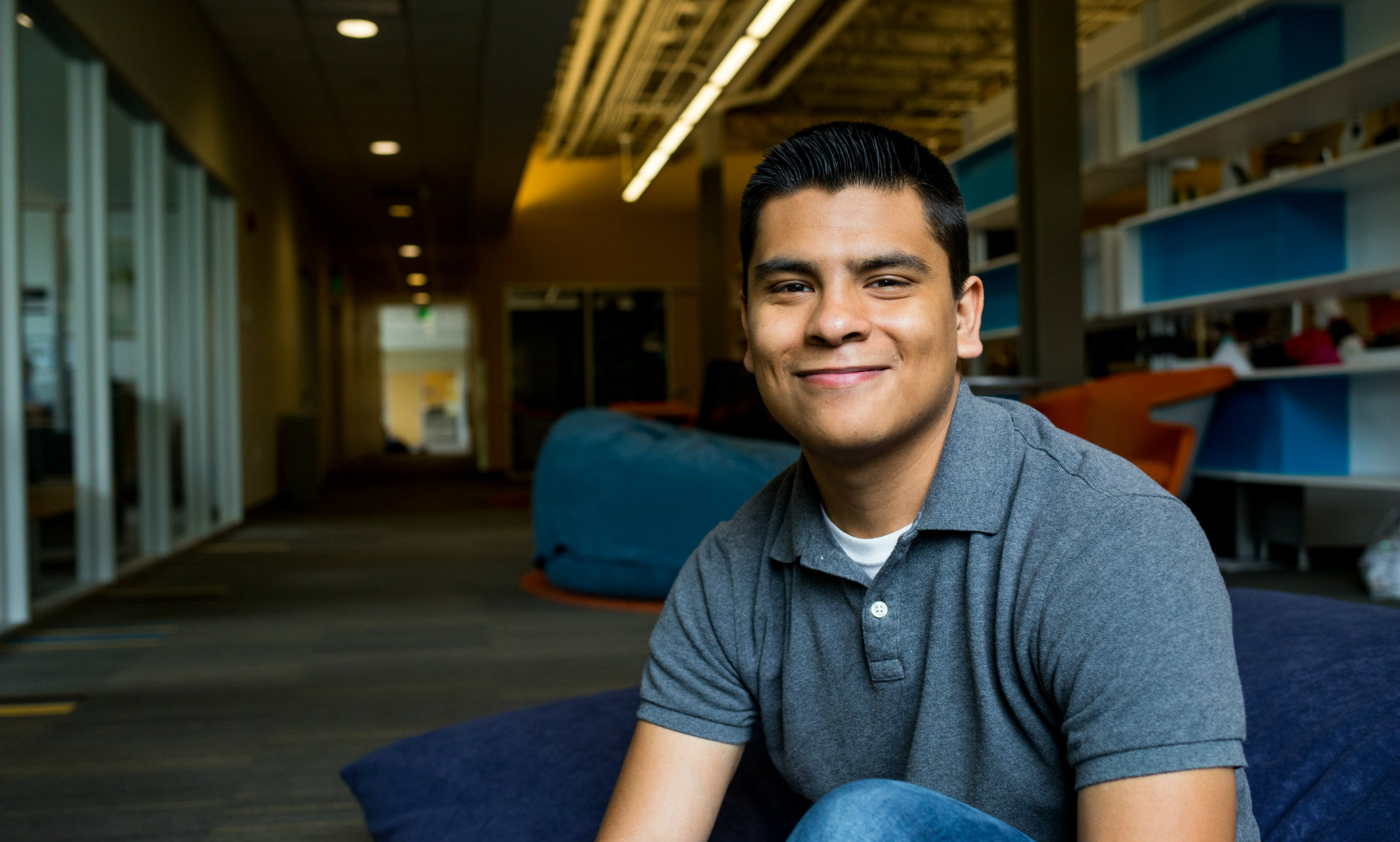
Jonny Gutierrez feels more educational attention should be paid to pre-teens
Get to know our people and you’ll know what UMKC is all about.
Jonny Gutierrez ‘19 Hometown: Liberal, Kansas High School: Liberal High School Degree program: Bachelor of Arts, History, College of Arts and Sciences
Why did you choose UMKC?
My brother was playing for Sporting KC's Youth Academy so he was already set up here. We would always come visit and I fell in love with Kansas City and got really interested in UMKC. I come from a small town and honestly wanted to get out of it. I took advantage of my brother being here and I moved in with him.
“I want to teach middle school…your education matters at this age. It leads you to what you’re going to do in your life.”
Why did you choose history?
I have always been fascinated by different kinds of history. As a kid, I was into books that had anything to do with history. As time changed, I slowly began to step away from it. I came to UMKC with a completely different path. I was going to go into the dentistry field and only minor in history. As I got more involved with history classes, I decided to take that passion I had for history as a kid and make it my major!
What do you hope to take from your experiences at UMKC into your professional career?
I want to become a middle school teacher someday, God willing. I feel middle school is often ignored. But your education matters at that age. It leads you to what you’re going to do in your life.
I want to teach history and shine a light on the things that don’t get enough attention. For example, the Latino civil rights movement in America, from the 1940s to 1970s. People fought for what they believe in. They fought for equality.
“I want to teach history. I want to shine a light on the things that don’t get enough attention.”
What are the benefits of the history program?
History is actually more challenging than people think. Being a historian means you have to constantly do research, so papers and essays are frequent in the history program. This means always looking for primary and secondary sources, which can sometimes be difficult and time consuming. Writing research papers has become my life.
One of the benefits is that because most history classes are not very big, you really get to know your professors. They all have done their fair share of research over the years, so they understand the struggles of it and are always more than happy to help and it helps in building connections and relationships with them.
Are you a first-generation college student?
Yes, I am, which was a bit hard in the beginning because we really didn't know how the whole college process worked. Being a first-generation college student puts more pressure on you, but in a good way. It makes me push myself to inspire others who will come after me and to make my parents proud of the sacrifices they have made to give me a better life.
What do you admire most at UMKC?
This might be a bit cliché, but I really admire the diversity at this school. Being Mexican American, I feel extremely welcomed, and it motivates me more because I know I have different kinds of support behind me and that means the world to me.
You seem to be in a lot of extracurricular activities at UMKC.
I am on the executive board for the Association of Latin American Students (ALAS) and a scholar in the Avanzando Mentoring Program. ALAS has helped me get to know fellow Latinx students on campus and about different Latinx cultures. Thanks to the group’s leader Iván Ramirez, Avanzando has provided me with different resources and has helped me meet and network with some amazing people. Being in the program motivates me every day. Both ALAS and Avanzando have ultimately helped me find a family here on campus!
“Being a first-generation college student puts more pressure on you, but in a good way. It makes me push myself to inspire others.”
Do you have any scholarships?
I am a recipient of the Chancellor's Historically Underrepresented Minority Scholarship that pays my out-of-state tuition. This scholarship helps in showing that UMKC cares about and believes in the education of minority groups.
May 15, 2019
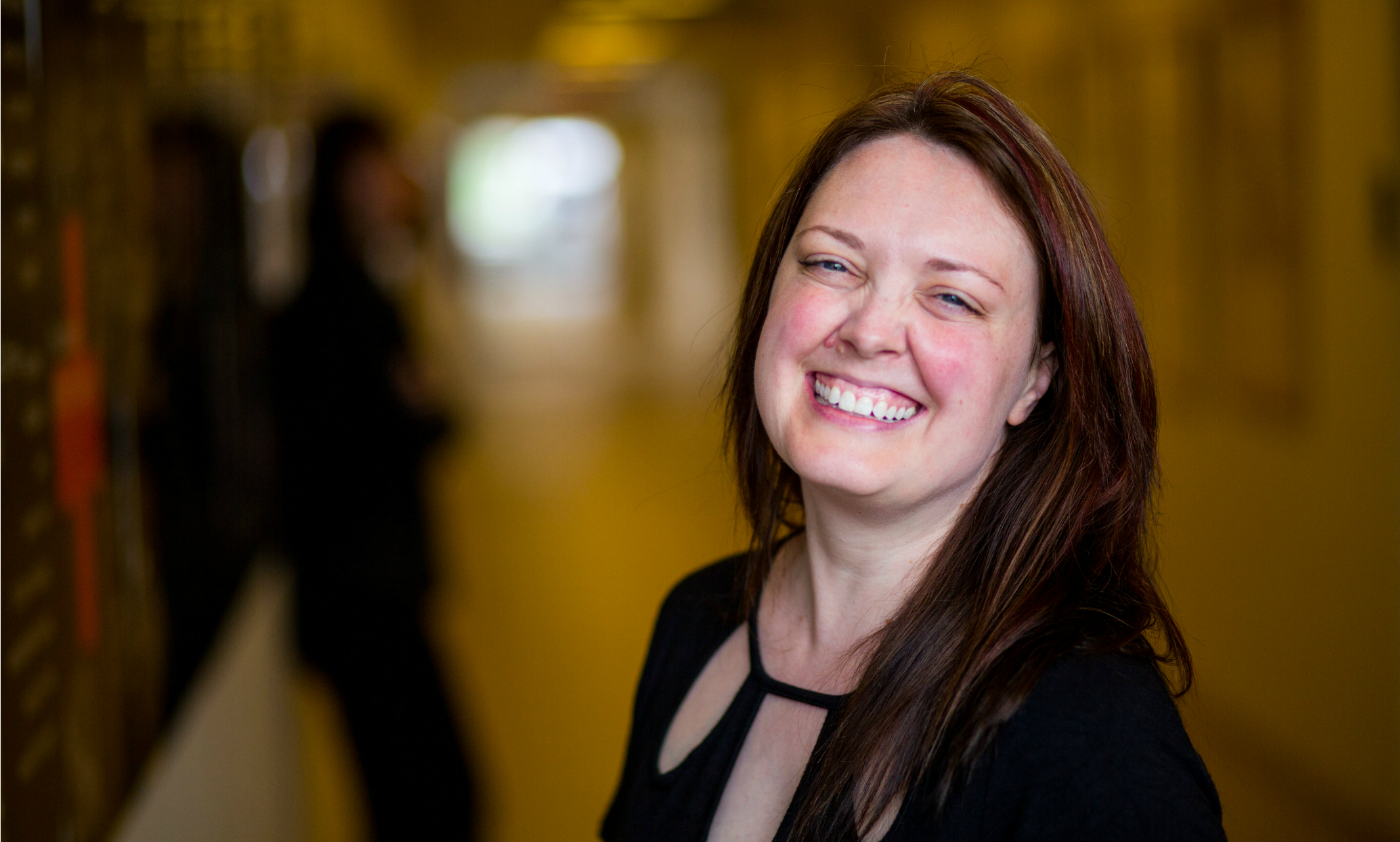
School of Nursing and Health Studies advisor puts students first
“Students are at the very center of everything we do at UMKC,” says Corrina Beck, academic advisor, School of Nursing and Health Studies and recipient of the Excellence in Student Success Staff Award. “I want the students to know they are not just a number to me or anyone else here, and I want them to treat people the same way when they go out into their various health fields.”
Beck’s co-workers nominated her for the award because they see her go above and beyond with each student with whom she comes in contact. They recognize that her focus makes the difference during her interactions with students.
“We worked together in the admissions office, and she made sure that every student that she admitted felt cared for and was treated professionally,” says Jennifer Lyles, academic advisor for the School of Nursing and Health Studies, and one of the people who nominated her.
Admired for her warm and professional approach to students and the tasks at hand, Beck is dedicated to helping students in the School of Nursing and Health Studies plan their paths from enrollment to graduation. A member of the Advising Leadership Team, Beck also provides feedback to the university’s Student Affairs and Enrollment Management team from the student perspective.
Beck thinks that it is important to tune out the background noise for the time she is with students.
“The students I advise have my complete attention.” Corrina Beck
But Beck has not focused only on her work. She recently completed her Masters in Higher Education Administration. She is grateful that she had so many people support her in her efforts.
“I have an amazing support system, both at work and at home,” she says. “My family and friends knew how important it was to me to finish my masters, so they helped in every way they could to limit distractions at home and, yes, to listen to me vent when I needed it. My coworkers and supervisor were incredibly supportive, as well, and were so flexible with me. I feel really lucky to have such many amazing people in my corner.”
Beck was humbled and honored when she learned her co-workers had nominated her for this award.
“There are so many talented people working here who deserve awards, and to be considered for one of them left me speechless—and anyone who knows me knows that I am rarely speechless!”
Hunt thinks there is no one more deserving of this award.
“At times Corrina is not only an advisor, but a therapist, coach, friend or like a close family member. She provides a level of mentoring that is unequaled at UMKC.”
May 14, 2019
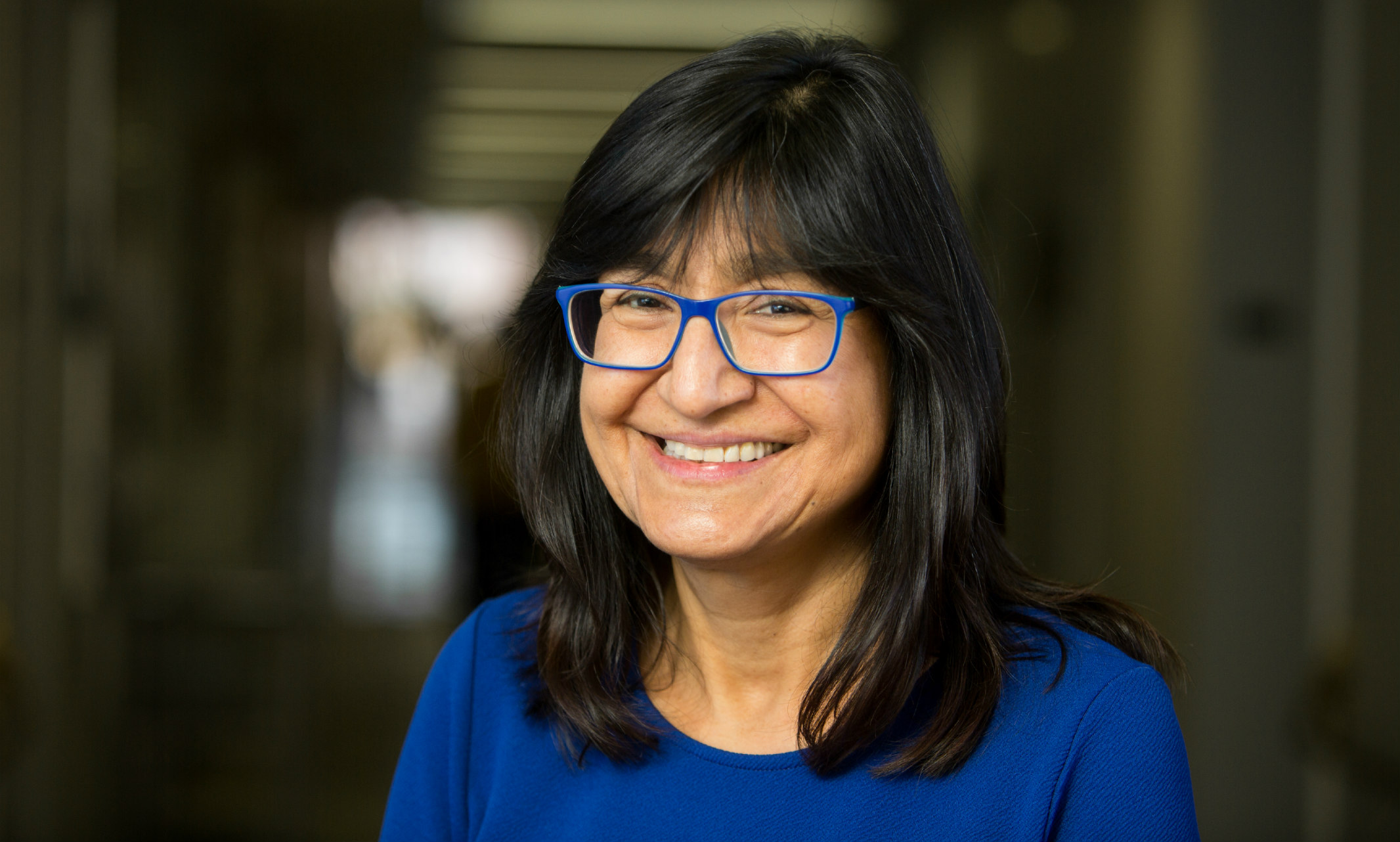
School of Biological Sciences faculty nominated Mary Flores for attitude and aptitude
Mary Flores is a stable force amidst the swirl of activity in the administrative offices of the School of Biological Sciences. Flores’s nominations for the Chancellor’s Staff Award for Extraordinary Contributions included submissions from Dean Theodore White and Marilyn Yoder, head of the division of cell biology and biophysics.
But most notably, the school faculty wrote a letter to support her nomination. It stated: “The page restrictions for this letter prevent us from offering a complete expression of our gratitude for Mary’s contribution to our work efforts.” An unsolicited letter from a student thanking her for her kindness was submitted with her application as well.
“I was very surprised to get a call directly from Chancellor Agrawal informing me of the award,” says Flores, senior business support specialist in the Division of Cell Biology and Biophysics. “I initially thought that perhaps he was looking for the dean or division head.”
"I love that my job is so diverse." Mary Flores
In his call, Chancellor Agrawal mentioned that he had never seen so many signatures on a nomination letter. While Flores feels that she is not going over and beyond what is expected at SBS, her co-workers do not agree.
“Of any faculty or staff we have met, Mary is the most positive and optimistic person,” says Dean White. “She is an extraordinarily unselfish employee. Her focus on students, education and the needs of the faculty is inspiring and motivational to those around her. She is a wonderful ambassador for our university.”
It is Flores’s optimistic attitude that shines through each of the nominations. The words “best” and “helpful” appear again and again.
“I love that my job is so diverse,” says Flores. “When there are questions, I try, to the best of my ability, to answer whether by phone, email or personally – my door is always open. If I don’t know something, I know who to call or email to get an answer as quickly as I can.”
This is just the mindset that her colleagues admire.
May 08, 2019
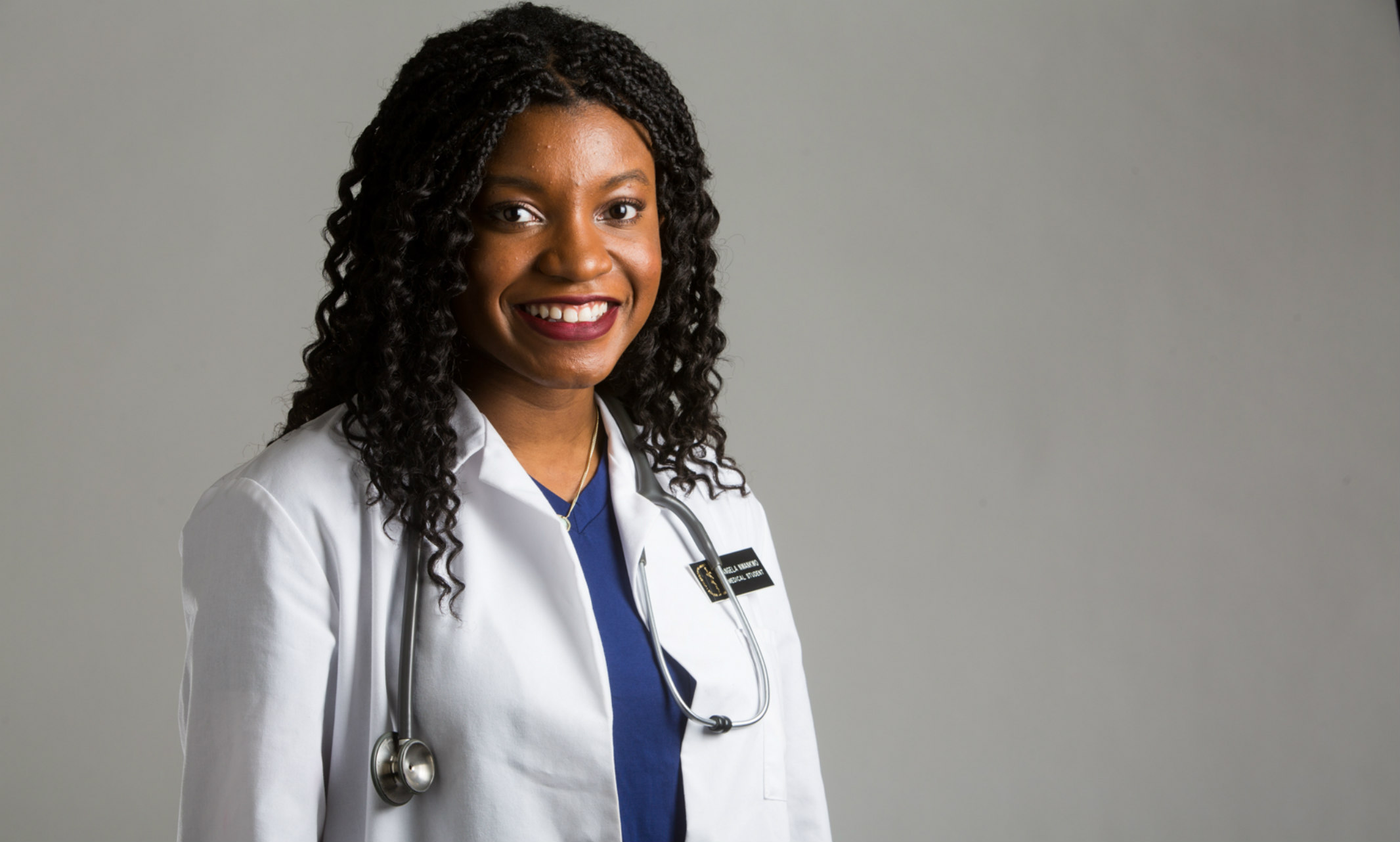
Angela Nwankwo thrives in the innovative program
Get to know our people and you’ll know what UMKC is all about.
Angela Nwankwo Hometown: Oklahoma City, OklahomaHigh School: Putnam City North High SchoolUMKC degree program: Combined B.A./M.D. Program, School of Medicine
Why did you choose UMKC?
The biggest reason is because I was accepted into the accelerated medical program right after high school. Who could turn down getting into medical school right after high school? More importantly, I knew without a doubt that I wanted to become a physician. The closest combined medical program to me was UMKC and I wanted to stay closer to home, in addition, there was no MCAT requirement and you get clinical experience within the first two weeks of the program, that’s something that no other medical programs can guarantee!
Why did you choose to study medicine?
Ever since I was a child, I knew I wanted to be a doctor. I think of my pediatrician and what an impact he made on me. He cared for people, and now I, too, have the privilege of caring for my patients on a daily basis. It's very exciting to make a positive impact in the lives of my patients. It's extremely rewarding, and I consider time with each patient absolutely priceless. Medicine exists at the intersection of country, culture, race, and finance. Studying medicine provides me with the unique ability to make an impact on a global scale– whether it’s international medicine, healthcare policy, quality assurance, disaster relief, educational reform, or being a community leader. I am filled with hope for the future of medicine and its interdisciplinary aspects which fuel my strong desire to make an impact in medicine as a Nigerian woman in America. Overall, I know that medicine is the perfect fit for me! I truly cannot see myself doing anything else.
"Who could turn down getting into medical school right after high school? I knew without a doubt that I wanted to become a physician."
What are the challenges and benefits of UMKC’s accelerated program?
We’re young, and this is both a benefit and a disadvantage. We get to graduate early, but we are also forced to grow up fast. We have to come in at such an early age and commit to the practice of medicine. The good thing is that you can find out sooner if this field is really not for you — and if you love it, you get to go all in to start your career. The path to becoming a doctor is quite sacrificial and can be a long road. My classmates and I have to embody a sense of selflessness in our pursuit to help others because we give up a lot! It’s not easy to be in the library, but see all your friends on the beach.
Another benefit is that we get a lot of clinical experience. We are learning medicine and shadowing doctors at the same time. We get exposure to experiences other medical students at different schools don’t have for years. Also, I am surrounded by peers with like-minded goals. In school, it is good to have a supportive community of friends and classmates, so it helps that we all work hard and study together!
Since entering college, what have you learned about yourself?
I have learned to strive for progress not perfection. That way I push myself to become the best version of me possible. In this way, I believe that I have grown wiser, stronger and closer to God. I have learned more about where I see myself in my future profession and how I function best as a student. Throughout middle school and high school, I was involved in a large variety of extracurricular activities and I believed that this helped me to better balance my schoolwork. I thought in college this would change, but I quickly learned that it is just my nature to be super involved in school while staying engaged in my studies. I love staying busy!
"We get exposure to experiences other medical students at different schools don’t have for years."
What’s the best piece of advice you have ever received from a professor?
“Well done is better than well said.” It is easy to talk about your dreams and wishes, but it is another thing to go after them and achieve them. We have a lot of opportunities in America to explore different things that interest us and a lot of resources at our demand, these should be taken advantage of. There is not another time in your life quite like your young adult years, there is no better time than now.
What do you admire most about UMKC?
The community at UMKC is awesome. There is a diverse group of students on campus and a lot of cultures represented. You can learn a lot from everyone you meet. The faculty here are very supportive. At the medical school, they really care about each student’s success and well-being. There are a lot of programs and initiatives held at the requests of students, so I like how administrators really value the input of students. I cannot think of one interest I’ve had that I have not been able to explore at UMKC, from learning Spanish and French, to doing research!
"Well done is better than well said."
What’s your greatest fear?
My greatest fear would be not making an impact in the world during my lifetime. I want to make a change through advocacy, philanthropy, engaging or influencing society. I know that I am more fortunate than others with the opportunity for education, so I want to use my privileges to help others who do not have them.
What is one word that best describes you?
Blessed. It is an honor to be where I am, studying to achieve my dreams. Not everyone has this opportunity, so I never take it for granted. I have always nurtured a strong desire and determination to succeed, and this is something my parents have instilled in my siblings and I from a young age. I believe being Nigerian contributes to this because Africans as a whole tend to have high aspirations for their families.
May 08, 2019
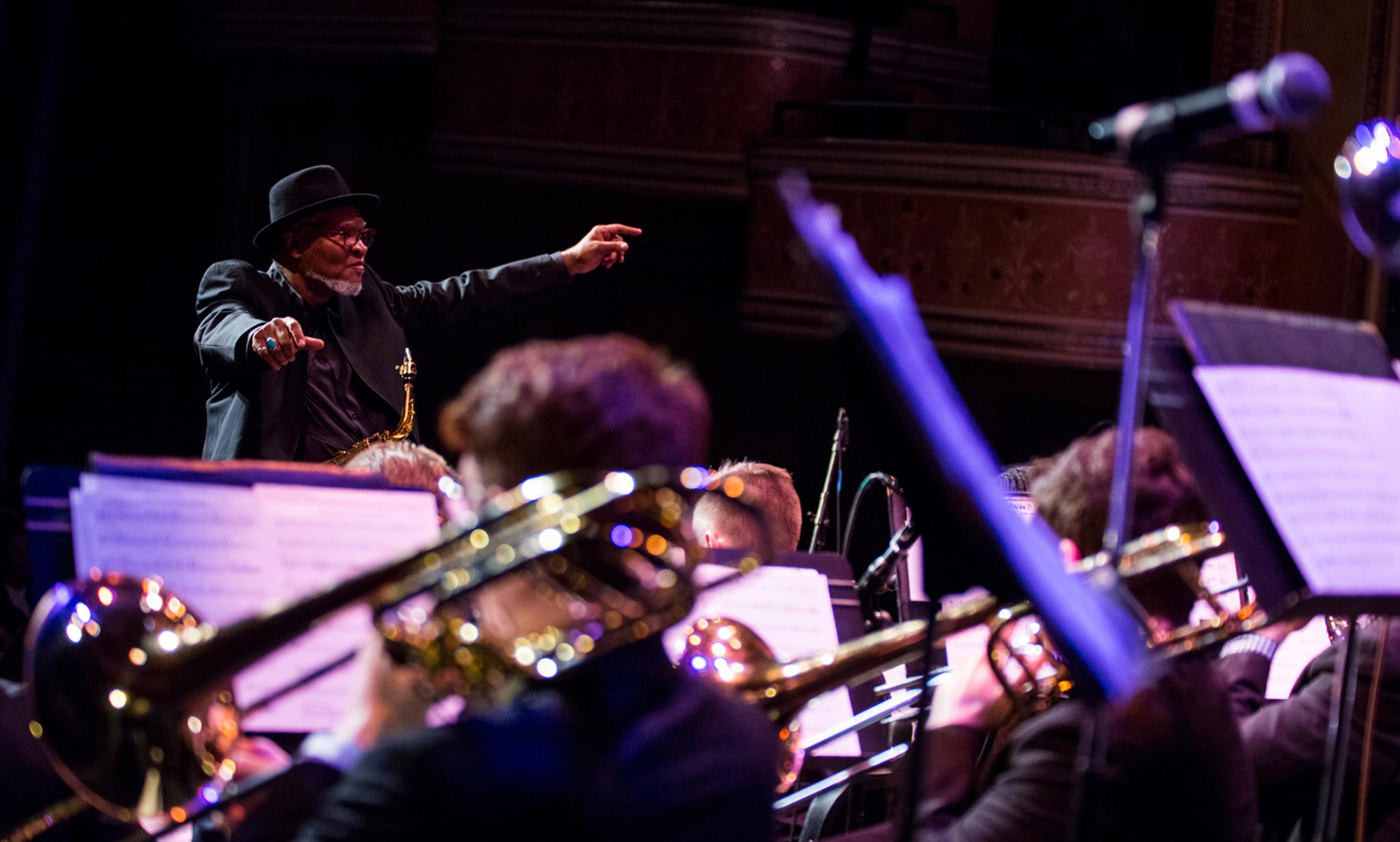
Jazz Studies Co-Coordinator Bobby Watson to serve next as UMKC ambassador
Jazz students at the UMKC Conservatory of Music and Dance put on a lively show at the annual Jazz Night performance at the Folly Theater in downtown Kansas City.
Bobby Watson and Mitch Butler, co-coordinators, led the students through several pieces that showcased the caliber of the Jazz Studies program. Christian Swan, senior, says the event is one he will never forget.
“As a graduating senior, this event has provided me with the opportunity to play in one of the premiere theaters in Kansas City,” Swan says. “Jazz Night at The Folly has given me the chance to play on the same stage as some of my heroes and create music in an environment that prepares me for a career in performing.”
For many of those students, Bobby Watson, a world-renowned jazz musician, is one of those heroes. At the event, Watson announced he will spend his last year (the upcoming 2019-2020 academic year) as the William D. and Mary Grant/Missouri Professor of Jazz Studies and co-coordinator of Jazz Studies serving as a Global Jazz Ambassador for UMKC. During this time, he will travel and perform throughout the world, promoting UMKC, The Conservatory, and the Jazz Studies Program.
“We are grateful to UMKC leadership for supporting Bobby in this ambassadorship,” says UMKC Conservatory Dean Diane Petrella. “This is the perfect way for an artist of his caliber to celebrate twenty years of commitment to jazz in Kansas City.”
Here's a behind-the-scenes look at Jazz Night 2019.
“Jazz Night at The Folly has given me the chance to play on the same stage as some of my heroes and create music in an environment that prepares me for a career in performing.” – Christian Swan, senior
“This is the perfect way for an artist of his caliber to celebrate twenty years of commitment to jazz in Kansas City.”
– Dean Diane Petrella on Watson's new role as ambassador
May 03, 2019
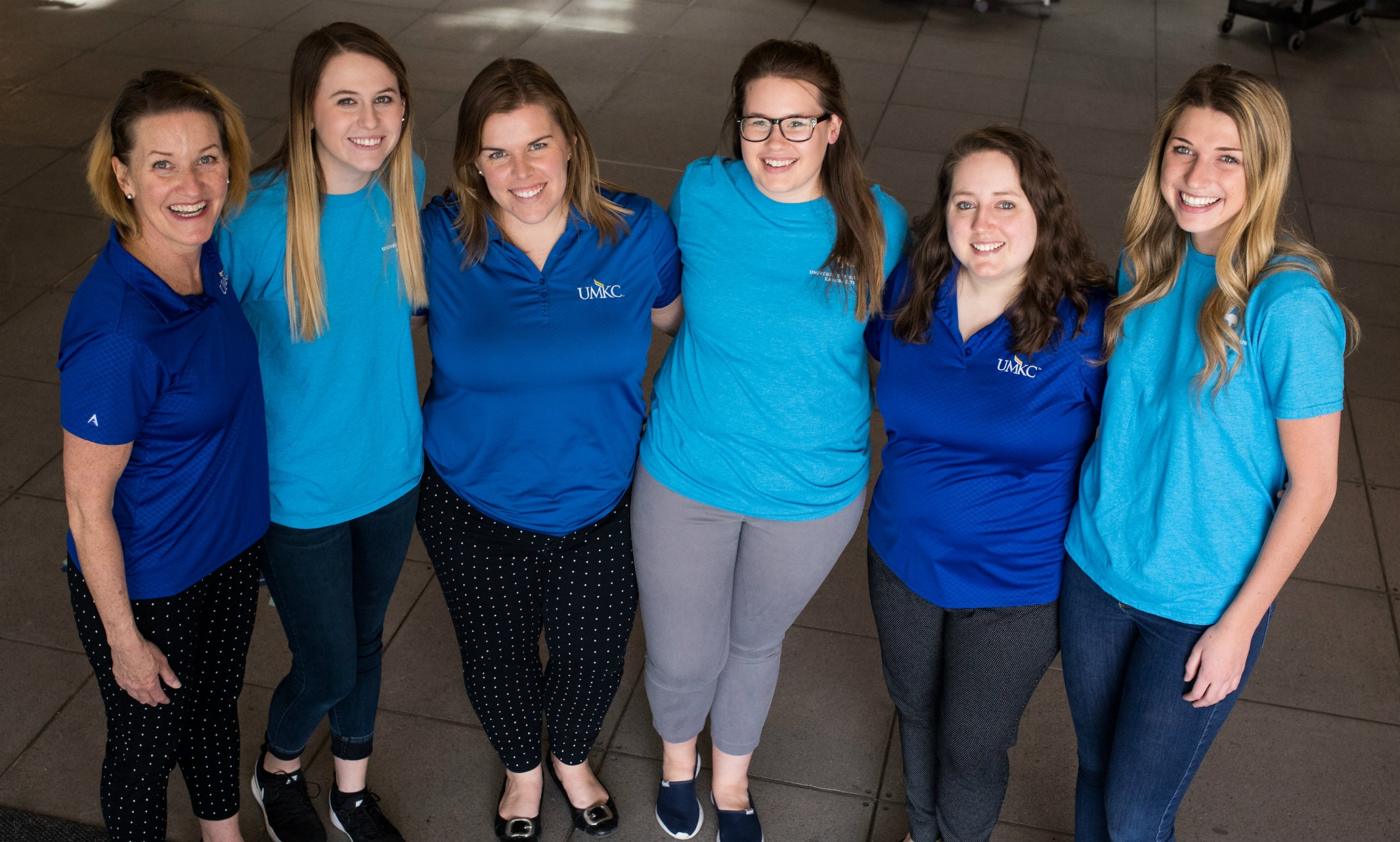
Erin Christensen focuses on the big picture to build relationships with potential employers for UMKC students
The most successful and influential project leaders tackle the task at hand by going beyond expectations. Erin Christensen excels at maintaining and enhancing existing relationships and programs while developing new ones. She continually identifies and cultivates new opportunities for students at the Henry W. Bloch School of Management and beyond.
“Erin is an extraordinary collaborator,” says Maggie Reyland, professional career manager at the Bloch Career Center and one of Christensen’s nominators for the Excellence in Engagement and Staff Outreach Award. “She identified an opportunity to collaborate more closely with the School of Computing and Engineering and from there we now have a robust Business, Computing and Engineering Fair each semester that continues to grow.”
Christensen, manager employee relations and outreach at the Bloch Career Center, thinks it’s important to be innovative and forward thinking.
“It can be easy to get caught up in the details, but that really isn’t what the bigger picture is about,” Christensen says. “For me, this way of thinking is critical for success with building relationships. I want to make sure that we are strategic with our resources internally and sometimes that means collaborating with another academic unit outside of the Bloch School, so continuing to build those relationships and being a collaborator is important.
"Sometimes it might be easier if I try to do something myself, but what fun is that?" Erin Christensen
Additionally, I want to make sure that the companies we are engaging with are relevant to the needs and goals of our students, so thinking more strategically about identifying who they are and how we can connect with them continues to be a priority.”
The Bloch School recently introduced Launchpad, an honors program designed to attract and retain high-performing students. Christensen took it upon herself to write a more detailed program proposal, which outlines programs expectations for students and marketing opportunities.
“Erin volunteered to take the lead on the career engagement piece for Launchpad,” says Tess Surprenant, director of the Bloch Career Center. “This program will have a strong experiential learning and career development component. Erin is working with local employers in all sectors to build internship programs and provide varying levels of engagement.”
It is these types of collaborations that excites Christensen.
”Sometimes it might be easier if I try to do something myself, but what fun is that? I love working with people and connecting people, so maintaining strong relationships and going above and beyond comes easy to me,” she says. “Personally, I love the feeling of leaving a meeting with someone I just met and knowing that there is a future with them and UMKC and I made that happen.”
May 01, 2019
